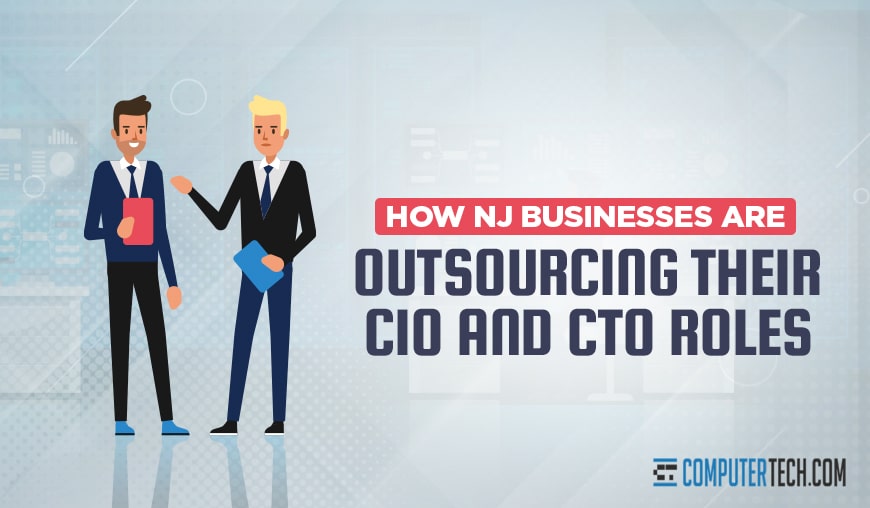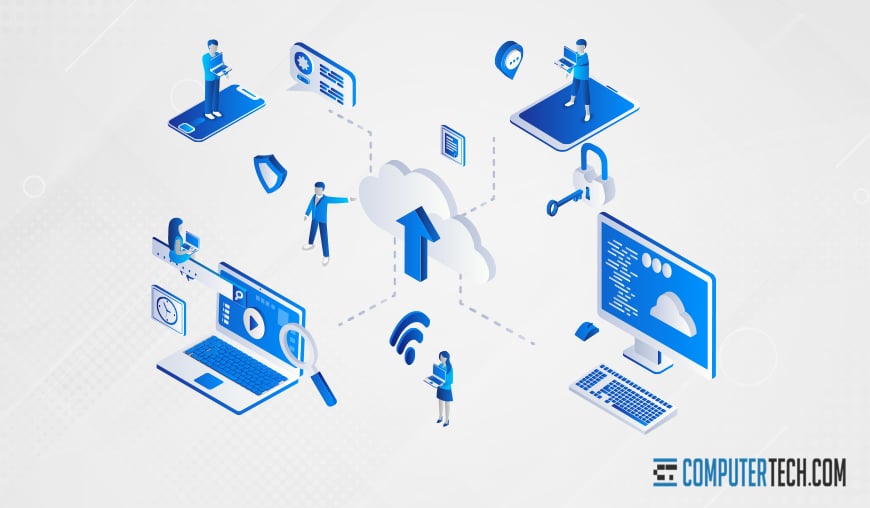-

New Jersey is full of businesses and full of people that have connections to the tech industry. Modern online business relies heavily on outsourcing, from cloud services to C-levels. Some roles are a little more complicated, making outsourcing them a more challenging endeavor. The businesses that have set out to do so seem to be succeeding at finding firms and contractors to handle the roles despite not being an official branch of the company. This outsourcing initiative has even spread to CIO and CTO positions that deal with sensitive information and data.
How are New Jersey businesses outsourcing these CIO and CTO positions, and what do these positions entail? Here’s a rundown.
What are CIOs and CTOs?
The Chief Information Officer (CIO) of a business is a critical position for many companies in the 21st Century. Since we have become more reliant on technology to conduct business, we need specialists to guide that technology’s overall direction and use. In essence, a CIO is an individual whose role is to make executive decisions regarding the purchase and integration of new IT equipment for corporate use.
They determine whether new resources are needed and lead teams to organize the data within these frameworks. They are also responsible for charting the IT strategy for the company and drafting the company’s IT policies. A CIO has to plan the company’s future IT needs and requirements and keep the IT team coordinated and organized while also implementing security measures to keep the information from falling into the wrong hands.
Because CIOs have such immense responsibility for keeping the information flowing, they have a high risk of failure. A prime example of a spectacular failure of a CIO occurred in 2013 when the CIO of the Target chain failed to prevent hackers from obtaining the details of 40,000,000 customer credit cards and the personal details of 70,000,000 customers. The CIO has a massive responsibility that makes outsourcing the position a daunting idea.

The Chief Technology Officer (CTO) of a business is a position that is just as important as the CIO but with slightly different responsibilities by comparison. A CTO generally operates under a CIO and works on the “big picture” of the company’s technical information needs while also having an in-depth understanding of the technology being used at the company. However, depending on the company, the CTO might be the only position and will also adopt the full range of responsibilities of the CIO.
Once again, the idea of outsourcing for such hefty responsibilities might seem daunting or even foolhardy. However, it is less of a risk than you might imagine and is a far more common practice in modern companies than you might expect.
Why Outsourcing Can Be Beneficial
Outsourcing means that, rather than having an in-house employee filling a particular role, you contract an outside office to handle a specific aspect of your business for you. Thus, you are employing an entire outside group to dedicate themselves entirely to this part of your business rather than having a single employee or small in-house team doing it. In some ways, outsourcing can be a beneficial practice that allows you to place focus on other parts of your business.
One of the biggest reasons a company might use an outside firm to handle its information technology needs is directly due to its size. A smaller company might not have the resources necessary to field an entire IT team under a C-level employee like a CTO or CIO full-time. You might have the resources to hire a C-level, but not the staff to allow them to focus entirely on the technical strategy you hired them to handle. Instead, they might get stuck doing basic IT tasks and wasting their talents. If your company has grown to the point that you need a full-time C-level executive, you might not have the financial resources needed to keep them on board.

Sometimes, you need multiple inputs to ensure you get what you need out of the IT department. One of the other benefits of outsourcing is that you are getting an entire firm’s worth of specialists and executives who will have different approaches to an issue. If you value having differing perspectives when solving a problem, using a firm to outsource your IT needs gives you access to an extensive range of viewpoints.
This will promote creative problem solving and can even lead to implementing new measures to reinforce the IT strategy your CIO would develop. You also gain access to any specialists with unique insight into certain technologies and programs. This kind of independence allows the company supervisors to focus on their own tasks without having to worry about overseeing the IT department. Especially since outsourcing to a firm generally means the specialists will have their own supervisors regulating them.
Another benefit, perhaps the most prevalent, is that outsourcing is simply less expensive than retaining a full-time CTO or CIO. When hiring a full-time employee, you are paying their salary, benefits, and other costs. Outsourcing allows you to minimize the costs of getting the talent you need for IT and C-level executives since you are paying the firm to handle your needs for a single price rather than accounting for several.
Modern businesses often operate on thin margins. Reducing costs and saving money anywhere you can is, therefore, a major component of business success. Whether you’re outsourcing infrequent IT assistance or full-time C-level management, you can save costs and spend that money elsewhere.

The final major benefit of outsourcing your IT needs is that it allows you to sidestep many companies’ biggest concern when hiring for any position, IT included. That concern is hiring someone who is a bad fit. There are any number of reasons that could render a candidate unsuitable for employment at your company. Sometimes a potential employee winds up having a poor work ethic or seeks to benefit from the company in ways that are ultimately bad for the company’s continued survival. Outsourcing puts the burden of choosing a high-quality representative on the company you choose to hire instead.
Outsourcing for your IT needs can be an excellent way of getting your company where it needs to be on a technical level. However, finding a firm that can be trusted for your outsourcing needs is the real tricky part. The bright side is that it is not always difficult, and there are ways to seek out the best possible firms to associate your company with and ensure top-tier IT talent. However, you will still have to determine which type of outsourcing is best for you.
How It Is Done
When outsourcing for any aspect of a company, two types of outsourcing are available: local and offshore. As you might expect, both forms are reasonably self-explanatory, with local outsourcing involving cooperating with a domestic firm while offshore involves collaborating with a foreign firm. Both forms have their advantages and drawbacks and can significantly affect your company’s ability to create an effective relationship with the 3rd party firm.

Most often, local outsourcing is used for high-level employees, including C-levels like the CIO and CTO. Foreign outsourcing is more often used for low-level support and daily tasks like data entry. That’s not to say that one is better than the other; just that they have different roles.
Comparing Domestic and Foreign Outsourcing
Offshore outsourcing is more commonly employed with larger companies and has many advantages responsible for its popularity. The most significant advantage is that offshore outsourcing gives your company access to international talent. Some of the most qualified IT professionals can be found in countries other than the USA, and they can be of incredible service to your company’s IT needs.
That said, there are also several drawbacks to offshore outsourcing that make it less appealing. One of the bigger issues is the language barriers that arise due to coordinating with foreign firms. For example, suppose you have outsourced your CIO and CTO roles to an IT firm in Japan, and those professionals only speak Japanese. In that case, there will be trouble discussing the state of the system with them if the company representative only speaks English. This also brings about the additional cost of requiring a full-time translator to help communicate with them when an issue arises.

This is why many companies that choose to outsource to foreign firms choose to outsource only low-level work, like user support and help desk. Higher-level IT tasks fall to domestic (or at least bilingual) hires, often those willing to move to New Jersey to work with your business directly.
Local outsourcing is a simpler method that ensures that the firm you are working with is fluent in the language you and your employees speak. For example, if you own a company in New Jersey, outsourcing the CTO and CIO roles to an IT firm in New Jersey or somewhere else in America will afford you all the advantages of outsourced labor without worrying about the drawbacks of language barriers or time zone issues. The only major drawback with local outsourcing is finding a reliable firm to grant the professional talent you need to operate smoothly.
Finding such a firm can be difficult, so research into the firms available is a must to ensure that you do not wind up hiring a firm that will give minimal effort. To that end, there are specific details about the firms and professionals you outsource to that you should know, to see how they fit into the framework of your company.
The 1st thing you should know is what kind of market the firm generally handles. For example, if you own a technology company, you would want to seek a firm that offers professionals geared towards providing service for these providers rather than one that only works with law firms. While many firms are well-rounded, some only have experience with one sort of system and will only provide top-level assistance for companies of the same nature.
The 2nd thing to know is whether they are a firm of thought leaders. When outsourcing for a CIO or CTO, you are looking for someone who can plan the future of your IT framework and remain on the cutting edge of new practices and resources that can enhance it. If the firm has a history of stagnation and simply sticking to the classic formula, they will do little to keep your system progressing and staying ahead of the competition.

If the firm you are considering collaborating with has both of these traits, then they might yet prove to be a valuable addition to your team and provide you with the CIO and/or CTO you need to keep your business operating smoothly, efficiently, and at the cutting edge. After that, it is simply a matter of reaching out to the firm and finding out the next step in retaining their service. The actual act of recruiting their services is the easiest part of the entire endeavor since it merely takes a phone call or e-mail to get things started.
Building the Strategy You Deserve
IT is a field that requires ingenuity and skill. Most companies have become completely digitized and rely on technology and cloud servers to keep operating effectively. However, staffing an IT department with in-house full-time staff can be extremely expensive if you are still getting your footing as a company. With the varying kinds of outsourcing and the number of IT firms available to offer their services, it has never been easier to find a partner for that very goal. First, however, research needs to be done to ensure the firms mesh with your company’s mission statement and goals.

If your business is in the market for high-level IT strategy and consulting, or if you have need of other managed IT services, you’ve come to the right place. Reach out to us today, and we can discuss the unique needs of your business and the services you’ll need to fill them, or if you have any additional questions or concerns.
About The Author
Herman
Herman is the lead team member here at Computertech.com. He’s been in IT for over 20 years and has expertise in our various IT Services including Microsoft Azure, Microsoft 365, Microsoft Teams and even Computer Security.
No related posts.
IT Support | IT Services | IT Consultant | Computer Support
Speak to a Human (856) 347-2282
- Home
- About Us
- Services
- IT Support
- Managed IT Services
- IT Consulting and Strategy
- IT Security Services
- IT Infrastructure Services and Networking
- Help Desk and Onsite Support
- Communication and Collaboration
- Specialist IT Services
- Data Backup and Disaster Recovery
- Cloud Computing
- Optimizing Network Consulting Services
- Remote Monitoring and IT Management
- Business Computer Services and Consulting
- Blog
- Contact Us
Navigation- Home
- About Us
- » About Computer Tech
- » What To Expect
- Services
- » IT Support
- » Managed IT Services
- » IT Consulting and Strategy
- » IT Security Services
- » IT Infrastructure Services and Networking
- » Help Desk and Onsite Support
- » Communication and Collaboration
- » Specialist IT Services
- » Data Backup and Disaster Recovery
- » Cloud Computing
- » Optimizing Network Consulting Services
- » Remote Monitoring and IT Management
- » Business Computer Services and Consulting
- Blog
- Contact Us
How NJ Businesses Are Outsourcing Their CIO and CTO Roles
In need of IT Services or IT Support? Call us today at (856) 347-2282
About Us
Computer Tech is an IT Consultant \ Computer Consultant firm providing Computer Support, IT Support and IT Services in South Jersey, IT Support North Jersey, IT Services Delaware, IT Services New Jersey, Philadelphia Pennsylvania.
(856) 347-2282Get started:
- 6 Things to Try if Your Work Laptop Won’t Boot Up
- The Ultimate Guide to IT Companies in New Jersey
- What is a Proactive IT Strategy and Why Do You Need One?
- How to Recover Data From a Broken Company Computer
- How NJ Businesses Are Outsourcing Their CIO and CTO Roles
- 8 Benefits of Using a Local New Jersey IT Company
- The Benefits of Managed IT Support Services for Businesses
- How Outsourced IT Support Can Help Employees Working Remotely
- [Guide] What Exactly Does an IT Support Company Do?
- Onsite IT vs Remote: How to Choose the Best for Your Business
Newsletter
Computer Tech, LLC.
105 Market Pl Suite 1, Glassboro, NJ 08028
(856) 347-2282
© Copyright 2025 HighTech Business Solutions. All Rights Reserved.



